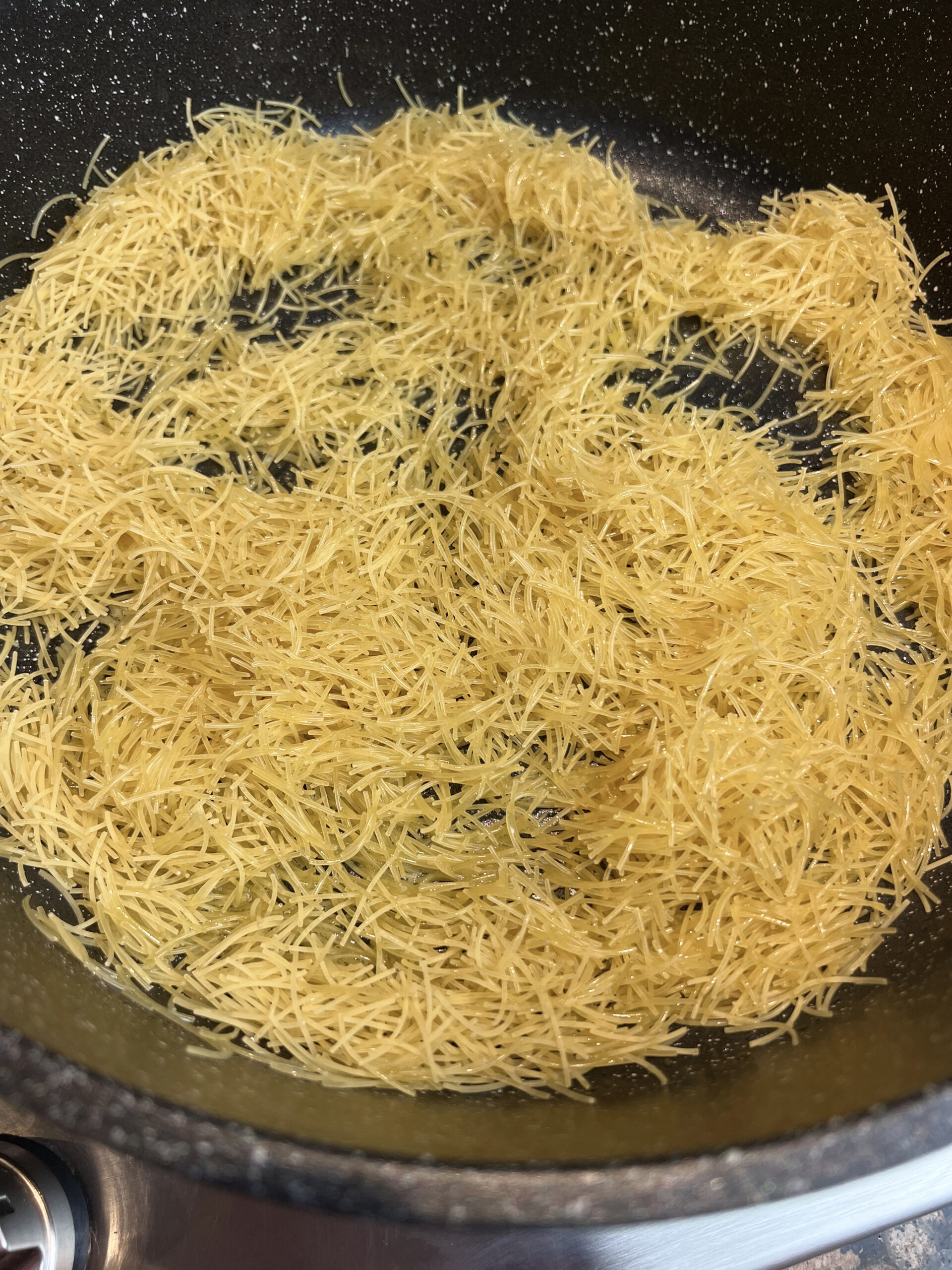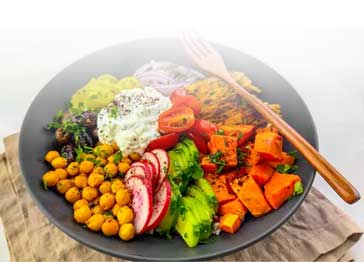Make this easy and delicious rice vermicelli dish in no time! All you need is a package of rice vermicelli noodles, olive oil, and ghee. This side dish pairs well with practically any entrée, and it takes just a few minutes to prepare to make it the perfect addition to any meal.
Table of Contents
Lebanese rice with vermicelli is a staple in Middle Eastern cuisine and one of the most beloved rice dishes. It’s crafted using long-grain rice and vermicelli noodles, first toasted in ghee. The result is a visually stunning dish with golden, fried vermicelli noodles that lend an exquisite touch to the rice. The toasting process also imparts a delightful nutty flavor, elevating the overall dish.
In Arabic, this rice dish is known as ‘RUZ MA SHARREH,’ which directly translates to ‘rice with vermicelli.’ In my home country of Jordan, this Lebanese rice is frequently on our dining table, appearing almost four times a week. We enjoy it alongside bamia with lamb, roasted chicken, or the delicious molokhia, a savory combination of jute mallow leaves and shredded chicken.
This Lebanese rice dish, much like other Middle Eastern rice variations, including hashwa, Greek yellow rice, and Yemeni rice, holds a special place in our daily meals, reflecting the region’s rich and diverse culinary traditions.
Lebanese Rice Ingredients:
- Jasmine Long Grain Rice: Provides a fragrant, slightly floral aroma and a light, fluffy texture.
- Vermicelli Noodles (1 cup): Offers a toasty, nutty flavor and a pleasant chewiness to the rice.
- Warm Water or Broth (1.5 cups): Infuses depth and richness, enhancing the overall flavor profile.
- Olive Oil (2 tablespoons) and Ghee (1 tablespoon): Combination of fats for richness and depth of flavor. Olive oil adds a fruity note, while ghee contributes a rich, buttery taste.
- Dash of Salt: Enhances the flavors and balances the dish, bringing out the natural tastes of the ingredients.
Tips for the Best Rice with Vermicelli
- Rinse the Rice Thoroughly: To achieve the best fluffy and non-sticky rice, wash the rice a few times to remove excess starch. Use your fingers to gently move the rice around while rinsing until the water clears.
- Soak the Rice (Optional): For optimal results, soak the rice in warm water for about 20 minutes before cooking. This can help the rice grains expand and cook more evenly.
- Adjust Vermicelli Quantity: Tailor the amount of vermicelli to your preference. If you like more vermicelli, feel free to add extra. Toast the vermicelli in the same pot you’ll use for cooking to preserve all the flavors.
- Toast Vermicelli Carefully: When toasting the vermicelli, stir it frequently to prevent burning. The color will change from light brown to dark brown; the darker it gets, the nuttier the flavor becomes.
- Fluff with a Fork: Always use a fork to fluff the rice after the rice is cooked. Avoid using a spoon, which can compress the grains, resulting in mushy rice. Fluffing keeps the vermicelli rice grains separate and light.
- Rice-to-Water Ratio: Generally, for every cup of uncooked rice, you’ll need approximately 1.5 to 2 cups of water or broth, depending on your desired rice texture. Soaked rice may require slightly less liquid. Keep in mind that one cup of uncooked rice typically yields about 3 cups of cooked rice.
- Note that 2 cups of uncooked jasmine long-grain rice will typically yield around 4 cups of cooked rice. However, keep in mind that the exact yield may vary depending on factors such as cooking methods and the amount of water used. Adjust the amount of rice you cook based on your family size and serving size needs. When cooking 2 cups of rice, I recommend using a pot of at least 2 quarts (or 4-6 cups) to ensure that the rice is cooked perfectly.
Following these tips, you’ll master the art of preparing the best Middle Eastern rice with vermicelli, ensuring a delightful and satisfying dish every time. Enjoy!
What Should I Serve Lebanese Rice With?
When it comes to serving vermicelli rice, you have plenty of options to choose from. With its light ghee and olive oil flavors, this Middle Eastern dish pairs well with various other Middle Eastern delights. For instance, you can enjoy it alongside a refreshing yogurt cucumber salad or as a side dish to complement the rich flavors of beef goulash. If you’re in the mood for poultry, consider serving it with a flavorful chicken tagine. Kofta kebabs with tahini sauce or lamb chops seasoned with rosemary and garlic make for satisfying and harmonious pairings with vermicelli rice. And if you’re feeling adventurous, try it alongside a dish like stuffed eggplant karniyark.
Lastly, don’t forget to explore my other rice recipes, including Yemeni-style basmati rice, Greek lemon-yellow rice, and a Mediterranean rice bowl with za’atar and feta. With vermicelli rice, you can create a meal that suits your taste and preferences, making every dining experience delightful. Enjoy your culinary journey!
Preparation



Add olive oil and ghee or butter to the pot you will cook your rice. Let it melt before you toast the vermicelli noodles.

Add the water depending on the amount of soaked rice you use. I used 2 cups of water for every cup of rice. I bring the water to a boil, then cover the pot and lower the heat. The rice should simmer for 15 to 20 minutes, and try not to open the pot while cooking.

Now your vermicelli rice is done! Uncover the pot and fluff the rice with a fork. Enjoy!
Ingredients:
Adjust Servings
| 2 cups jasmine rice | |
| 1 cup vermicelli noodles | |
| 4 cups warm water or broth | |
| 1 tablespoon olive oil | |
| 1 tablespoon ghee or unsalted butter | |
| Dash of salt |
Preparation
Recipe Tips & Suggestions
How to Store Leftover Rice with Vermicelli
Nutrition Information
The information shown is an estimate provided by an online nutrition calculator. It should should not be considered a substitute for a professional nutritionist's advice.
See our full nutrition disclosure here.
2 Comments
-
Sandra
Love this recipe! Easy on the whole family loves!







I would love to hear your experience!
Have you made this delicious rice and vermicelli recipe? Please feel free to leave a comment below. I love to hear from you.